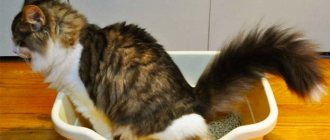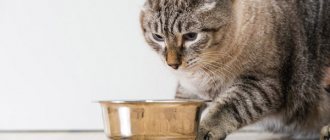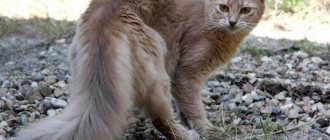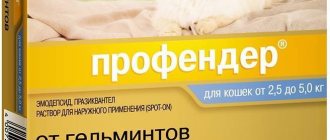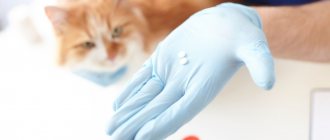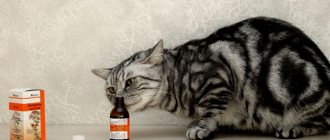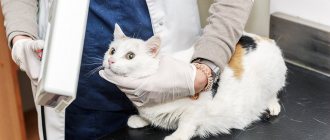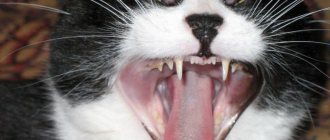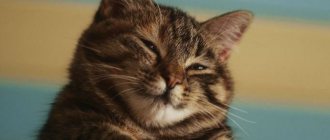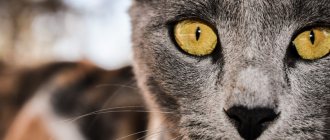Chemical composition and characteristics
Problems with the gastrointestinal tract are usually treated with diet and taking sorbents that remove toxic substances from the body. One of these products is Polysorb. In veterinary medicine, a concentrated drug containing 98% of the active substance is most often used.
Polysorb is effective for cats with digestive disorders, as well as during the rehabilitation period after surgery. Such a product is additionally marked with the letters “VP”. In medicine, powder labeled “MP” is used. The drug contains colloidal silicon dioxide in quantities: 12 g, 25 g, 50 g, 100 g - depending on the manufacturer and packaging.
Did you know? In 1963, for the first time, a cat named Felicette from France was sent into space.
Description
Polysorb is a veterinary drug that is used for animals: cats, dogs, fur-bearing animals. You need to know that there is a medical product with a similar name, Polysorb MP, which is a white powder and is used to treat people. It is very important not to confuse these different medications.
© shutterstock
Polysorb VP is a white or bluish powder. The manufacturer is domestic. It is produced exclusively in powder form; there are no tablets of a similar composition. The active ingredient is silicon dioxide. Two types of packaging are possible :
- In jars – 100 g.
- In plastic bags – 1.5 – 10 kg.
Each packaging unit is marked with the following information::
- Name of the manufacturing company.
- Location.
- Trademark.
- The name of the drug itself.
- Marked "For animals".
- Weight.
- Party series.
- Date of manufacture and shelf life.
- Storage conditions.
Instructions are also required.
Properties of the drug
The drug binds and removes toxins, food and bacterial allergens, microbes, toxic products that are formed as a result of protein breakdown in the intestines. The absorption of the drug in the gastrointestinal tract practically does not occur - it comes out unchanged. "Polysorb" is not a toxic drug for people and animals; it is classified in the fifth hazard class.
Poisoning in cats
This article was prompted by a recent incident. My Chupacabra really loves grass, a special green grass that is sold in pet stores. And then one day I bought him the wrong grass.
Although, it would seem, how can a pet store sell some kind of different herb!
In the evening, Chupacabra was gnawing grass with pleasure, and at night strange sounds were heard. And in the morning I discovered several strange puddles on the floor - Chupacabra was vomiting at night.
But since we are all accustomed to the fact that cats spit up their fur from time to time, especially if they are fluffy, I did not pay attention to this. And she went to work. And in the evening I found several more caustic puddles on the floor and a completely exhausted Chupacabra lying on the bed like a rag. The cat was clearly poisoned. But what could he have poisoned himself with?
Naturally, the newly acquired weed went into the trash, and the Chupacabra still had to be treated for several days. No one could have expected such a situation from simple cat grass.
I decided to ask in more detail about the causes of such poisonings from a specialist, veterinarian Marina Mikheenko , zoo
“A cat is the whole world” is an absolutely true statement. Not only figuratively, but also literally: in the gastrointestinal tract of every cat lives a whole ecosystem of beneficial and pathogenic microorganisms, the “force of good” and the “force of evil.” If a cat is healthy, its “good” always defeats “evil”. And the tray is in complete order. This ecosystem of bacteria, protozoa, viruses and microscopic fungi is called a biome, or microbiome. Hill's Pet Nutrition has spent a decade studying the microbiome of cats.
The result of these studies was a new dietary food for cats, Hill's PRESCRIPTION DIET Gastrointestinal Biome with chicken. The diet contains advanced ActiveBiome+ ingredient technology. This unique blend of prebiotic dietary fiber helps maintain microbiome balance, naturally restoring normal, regular bowel movements in your cat . The diet is rich in Omega-3 and Omega-6 polyunsaturated fatty acids and contains clinically proven antioxidants* that help support a healthy immune system.
Hill's new helps promote healthy digestion in cats, which helps improve overall body health.
When choosing a special food, be sure to consult a veterinarian
Release form
The product is available in the form of a loose white powder, tasteless and odorless. It is necessary to prepare a suspension for oral administration from it. The powder is packaged in individual bags made of label paper with an internal thermal layer, which are placed in cardboard packaging. Also, the medicine is available in polystyrene or PET jars.
Important! The use of the drug is possible only after consultation with a veterinarian. After establishing an accurate diagnosis, the doctor will prescribe the dosage and frequency of administration.
What can you give your cat for diarrhea?
In accordance with the identified problem, a decision is made to take medications. As a rule, treatment at home is carried out comprehensively and includes:
- sorbents for removing toxins;
- enzymes to normalize the functioning of the gastrointestinal tract against the background of enzyme deficiency;
- probiotics – to restore intestinal microflora;
- antibacterial and antiviral medications for infectious diarrhea;
- antihelminthic medications for helminthic infestations.
Antimicrobial and antiprotozoal drugs for diarrhea
Treatment of helminths and infectious diarrhea includes taking medications whose action is aimed at suppressing the activity of pathogenic flora and destroying parasitic microorganisms.
Metronidazole
This is a synthetic broad-spectrum antibacterial agent. Due to its antiulcer, antiprotozoal, trichomonacid and antimicrobial effects, it is used to treat diseases caused by parasitic microorganisms, as well as diseases of the bones, joints, central nervous system, gastrointestinal tract, genitourinary system and dermatological problems of an infectious nature.
The drug is not prescribed for the treatment of diarrhea in kittens and cats during pregnancy and lactation, as well as in pets with kidney and liver pathologies, with increased sensitivity to the active and auxiliary components of the drug.
Among the side effects, Metronidazole can cause:
- allergic itching, rash, shortness of breath and swelling;
- increased salivation;
- loss of appetite;
- vomiting;
- the appearance of blood in urine.
Expert opinion
Dubas Andrey Leonidovich
Leading physician therapist at the veterinary clinic of Dr. Bugaev
Metronidazole for diarrhea is administered to cats only after consultation with a veterinarian. A portion of the drug is calculated based on the weight of the pet in proportions from 10 to 20 mg of the active ingredient per kilogram of the pet.
Loperamide
It is an antidiarrheal agent with antimicrobial action. It is used for diarrhea due to changes in food products, as well as as an adjuvant therapy for infectious and allergic etiologies of disorders.
For diarrhea, Loperamide for cats is not prescribed for intestinal obstruction, drug poisoning, or for treatment during the gestational period. It is contraindicated to take the drug if bowel movements are accompanied by bleeding. The dosage of the drug is based on the weight of the animal: 0.25 tablets per 1 kg of animal weight.
Furazolidone
Diarrhea of a bacterial and protozoal nature can be stopped with the help of Furazolidone. This is a broad-spectrum antimicrobial drug prescribed for dysentery, paratyphoid fever, giardiasis, as well as toxic food poisoning.
The drug is not prescribed for hypersensitivity to the components.
The daily dosage for an adult cat is 0.25 tablets, which should be divided into 3 doses. Furazolidone can also be given to a kitten for diarrhea, while reducing the daily amount by 2 times.
Furazolidone puts a lot of stress on the liver, so you should avoid exceeding the daily dosage.
Levomycetin
To treat diarrhea in cats of bacterial etiology, Levomycetin with the active ingredient of the same name is often used. A broad-spectrum drug that is active against gram-positive and gram-negative bacteria that are resistant to penicillins, tetracyclines and sulfonlamides.
Contraindications to the use of Levomycetin are:
- hypersensitivity to chloramphenicol;
- cerebrovascular accident;
- porphyia;
- enzyme deficiency;
- kidney and liver dysfunction;
- dermatological pathologies.
Levomycetin is not prescribed to kittens for diarrhea. Also contraindicated for diarrhea in cats during gestation and lactation.
During treatment, an overdose can lead to disorders of the digestive tract, dysbiosis, internal bleeding, hallucinations, depression, rash, and fungal infection. The dosage for an adult pet is 0.25 tablets three times a day.
Enterofuril
Enterofuril - an antimicrobial medicine is available in the form of a suspension. The drug is safe, therefore it is prescribed for diarrhea in kittens and adult cats during pregnancy or lactation.
Contraindications are hypersensitivity to components and fructose intolerance. If the dosage is exceeded or hypersensitivity to nitrofuran, Enterofuril can cause allergic reactions in the form of rashes, itching and disorders of the digestive tract, which are accompanied by nausea and vomiting.
To treat diarrhea in adult pets, 2.5 ml is prescribed, and for kittens - 0.5 ml three times a day. The course of treatment is up to 10 days.
On the pharmaceutical market there is also a complete analogue of Enterofuril - Stopdiar, which can be used for bacterial diarrhea without fever.
Sorbents
This group of medications is used to remove toxic compounds from the body, which helps to significantly speed up the healing process and improve the general condition of a sick pet. It is definitely included in the comprehensive treatment of cats for diarrhea of various natures (poisoning, infection, parasites).
Activated carbon
Cheap and effective adsorbent. It has an enterosorbing, detoxifying and antidiarrheal effect. Absorbs and removes gases, toxins, metal salts, alkaloids, medications from the digestive tract.
Indications are dyspeptic disorders, intoxication of the body due to poisoning with drugs, toxic and chemical compounds, increased gas formation, bacterial and viral infections. It is not recommended to give medication to a kitten for diarrhea, as well as to pets with bleeding and ulcers of the gastrointestinal tract.
A single dosage is 5 g or 2 tablets 3-4 times a day. If the dosage is exceeded, it can lead to constipation and impaired absorption of nutrients.
Activated carbon turns stool black - discontinuation of the drug is not required.
Smecta
This is an effective adsorbent that removes toxins and creates a protective coating on the mucous membranes of the digestive tract.
Indications and possible limitations
The drug is used to treat acute intestinal diseases, including salmonellosis, foodborne toxic infections, which are accompanied by vomiting and diarrhea, and intoxications. It is used externally to treat skin ailments, purulent wounds, and ulcers.
For domestic cats, both a veterinary drug and Polysorb MP, which has a similar composition, can be used. It is used for complex therapy of helminthic infestation, as well as for the prevention of intestinal infections or poisoning, for example, in the case of eating poor-quality food, in preparation for vaccination.
When vomiting
When cats vomit, prepare a suspension of 1/2 teaspoon of powder diluted in 30 ml of water, which is given to the animal 5 times a day at intervals of 1 hour. To prevent dehydration of the body, therapy is supplemented with the drug "Regidron" - according to the instructions, 2-3 hours after the sorbent.
Did you know? The movement of a cat's ear is controlled by 32 muscles. Therefore, these animals are able to rotate their ears 180°.
For diarrhea
The sorbent treatment regimen for diarrhea will be the same as for vomiting. It is important to prevent dehydration and, in addition to Polysorb, force the animal to drink water using a syringe.
It is best to dilute Polysorb for cats with boiled water, approximately 20-30 ml. You can administer the drug using a syringe without a needle, slowly injecting it behind the cheek of a furry patient.
In case of poisoning
In case of poisoning, Polysorb is given 2-3 times a day. During the first 24 hours of therapy, the animal is not fed, only watered. From the second day they try, in small doses, to give diet food.
For chronic renal failure
For chronic renal failure, a 5-7-day course of body cleansing with Polysorb is prescribed. Usually the following regimen is prescribed: 1/3 tsp. dilute in 10 ml of water, drink the drug 30 minutes before meals (twice a day).
You will be interested to know why the cat lost his appetite.
Choosing the optimal dosage for your pet
From the moment of penetration into the body, the sorbent elements turn into magnets. They only affect pathogenic (dangerous) substances. In this case, beneficial bacteria are ignored, thanks to which the animal does not develop a complicated form of dysbiosis. In the pharmacy chain, the sorbent is sold in the form of sachets or powder. Regardless of the form of release, 1 teaspoon is equal to 1 mg of the substance. Once the veterinarian has determined the dosage, proceed as follows:
- It is better not to feed the animal until diarrhea stops;
- if even minor blood clots are observed in the stool, the drug should not be used temporarily;
- as soon as the health of the dog or cat has stabilized, it is necessary to dilute the amount of Polysorb recommended by the physician;
- it is given to the animal along with ordinary water;
- from the moment it enters the body, the sorbent molecules actively work for 2 to 4 hours.
Instructions for use
A suspension for oral use is prepared as follows:
- Add 1 tsp to a glass with 20 ml of still or chilled boiled water. (1 g) or 1 tbsp. l. (3 g) powder.
- Thoroughly mix the prepared suspension.
The cat must be given water from a syringe 2-3 times a day. For acute intestinal disorders, the course of treatment is from 3 to 5 days. On the recommendation of a veterinarian, the course can be extended to 10–15 days. Dry powder should not be given to a cat. It is also prohibited to mix it into food. The daily dose is calculated based on body weight.
Only a veterinarian can adjust dosage. After the symptoms are eliminated, you can continue to give your pet cat food. For 1 kg of live weight you need 0.05–0.25 g of Polysorb VP powder and 1 g of Polysorb MP. For cats weighing more than 3 kg, the daily dose should not exceed 1 tbsp. l. or 3 g. The medicine is given 1–2 hours before or after feeding. Before each use, the suspension must be mixed well, achieving a uniform distribution of the active substance.
Video: how to give Polysorb to a cat
How to correctly calculate the dose of Polysorb for a cat
Polysorb is prescribed based on weight, no matter who we are talking about, a person or a cat. The average dose is 1 mg per 1 kg. To correctly calculate the dosage, the cat must be measured. The easiest way to do this is on regular floor scales, weighing yourself with and without the cat. The resulting difference is the weight of the animal.
If an average cat weighs up to 3 kilograms, and one spoon holds 1 gram of sorbent, then you can calculate that you will need Polysorb literally at the tip of a teaspoon for one dose.
The drug is diluted with cooled boiling water, it is best to add a little water - no more than 20 ml. You can administer it to the animal with a syringe, because a furry pet is unlikely to drink such water on its own, they are too picky. You can take it for 4 days, do not forget to make sure that there is a sufficient amount of clean water in the bowl during this time.
Negative effects
The drug is usually well tolerated by animals and rarely has negative effects on cats. Side effects include allergic reactions, constipation, and disturbances in the digestive system. The product should not be used to treat pregnant and lactating cats, since testing has not been carried out on this group of animals. Also, you should not give the suspension to pets who have an individual intolerance to the active substance.
Despite the fact that, according to some people, cats have nine lives, they may not recover from severe poisoning. Since small kittens have not yet strengthened their immune systems, and diarrhea and vomiting can quickly lead to dehydration and death, you should not treat them yourself to prevent disastrous consequences. At the first manifestations of illness, it is better to immediately contact a veterinarian, who will be able to determine the exact cause of the disease and promptly prescribe competent treatment.
We recommend that you familiarize yourself with the features of keeping, feeding and caring for a cat.
Why vaccinate your domestic cat?
It is a mistake to believe that cats living in an apartment are reliably protected from infections and helminthic infestations. In order to get sick, an animal only needs contact with the owner’s shoes and clothes, not enough high-quality food or banal stroking with an unwashed hand. Because pets lick themselves, one parasite larva is enough to cause an infestation, and some infectious diseases, including rabies, are transmitted through tiny droplets of saliva and blood. And they may well end up on the owner’s shoes or street clothes. That is why vaccinations are equally necessary for both a pet that roams freely and an exclusively domestic cat.
Routine vaccinations are usually carried out in spring and autumn, when the likelihood of infection is higher. Before vaccination, the animal will be examined by a veterinarian, and 2 weeks before the injection, deworming will have to be done - the cat will be given an anthelmintic drug that will remove parasites and help reduce the risk of complications. The only problem is that the anthelmintic drops and tablets themselves are quite toxic, so 12 hours after taking them, you can give your cat a sorbent to preserve liver health.
Drug interactions
"Polysorb" can be used both as an independent medicine and in combination with other drugs in complex treatment, including antibiotics. When treating diseases accompanied by vomiting and diarrhea, it is necessary to provide the animal with plenty of fluids and drugs that retain fluid in the body, glucose solution. The minimum time interval between taking sorbents and other medications should be 30 minutes.
Drug analogues
Analogues of the drug enterosgel are polysorb, polyphepan, phosphalugel, atoxil, smecta, sorbent-gel, white activated carbon, endosorb, enterodes.
Enterosgel is a gentle absorbent that is safe for pets to take. The course of therapy should be drawn up and adjusted only by a veterinarian. As a rule, the course of treatment for intoxication of a cat’s body is from 4 to 7 days. For prolonged diarrhea that does not go away for about 5 days, you should contact a specialist for help and advice. An important rule that a cat owner must follow is not to self-medicate.
Storage conditions and shelf life
As indicated in the instructions, the drug can be used for 3 years after its release. The prepared suspension is suitable for use within two days under storage conditions: temperature - from +8°C to +15°C and humidity - no higher than 80%.
Important! Before giving the medicine to your cat, you need to make sure that the medicine has not expired. Using expired medication is strictly prohibited.
The powdered dosage form should be stored at a temperature no higher than +25° and no lower than 0°C, in the absence of humidity and exposure to sunlight. In a place inaccessible to children and pets, away from food and drinks.
Taking the necessary precautions
The drug should not be given to animals of any size in dry form. Before use, it must be diluted with warm water and stirred until a homogeneous mass is formed. The second reminder concerns the requirement to follow the dosage recommended by your veterinarian. On the one hand, no side effects were found in the sorbent, and, on the other hand, it is not worth risking the health of your pet.
Experienced veterinarians know that Polysorb is a broad-spectrum sorbent. It can be used even before the exact cause of intoxication has been established. The drug will quickly remove any toxin of any nature from the body:
- food poisoning.
- penetration of a bacterial or viral pathogen into the body.
- manifestation of allergies.
- metabolic disease.
- complications caused by protein breakdown.
- prolonged use of medications.
The sorbent has a wide spectrum of action, but to achieve the maximum therapeutic effect you need to talk to your veterinarian. He will tell you about the sorbent and how to give it to your dog or cat.
The veterinarian takes into account possible contraindications
Owners of our little brothers should know that the drug is strictly prohibited from being used in some cases. We are talking about pregnant and lactating females. An obstacle to the use of the substance Polysorb will be individual intolerance, peptic ulcer in any form, pathology of the duodenum.
A similar prohibition applies when the animal has intestinal obstruction or a violation of the integrity of the mucous membranes. In case of intoxication in puppies or kittens, the sorbent is allowed to be used only after talking with a veterinarian.
Enterosorbent Polysorb is useful not only for people, but also for cats. Even if your beloved pet lives only at home, you cannot be sure that he did not interact with your outdoor shoes, soil from flower pots, or catch and eat a fly flying by. That is why even those cats that never leave the house must be vaccinated against helminths twice a year in order not to become infectious to their owners and, of course, to live a long and happy cat life. However, the vaccines themselves, including tablets with drops against worms, turn out to be toxic and can cause poisoning in pets.
In order to avoid negative consequences, many veterinarians recommend giving cats Polysorb during this period, which should help cope with excessive intoxication.
Useful materials:
- Tobrex for cats Instructions for useTobrex drops contain a broad-spectrum antibiotic - tobramycin from the group...
- Amlodipine for cats Instructions for use of Amlodipine: in medicine and veterinary medicine VetConsultPlus Information portal Therapy Brief characteristics…
- Blood test in cats Types of cat blood tests and main indicators The most common are two types of blood tests - a general…
- Fosprenil for cats Instructions for use Fosprenil is administered to a cat intravenously, intramuscularly or subcutaneously. If necessary, an injection is allowed in…
Signs and symptoms of poisoning
The intensity of the signs of poisoning depends on the type and amount of poison that has entered the body. General signs of intoxication:
- temperature drop;
- vomiting, diarrhea;
- pupils do not react to light;
- lethargy, unsteady gait;
- heavy salivation;
- strong excitement;
- increased thirst, the cat often licks its nose;
- refusal to eat;
- difficulty breathing;
- convulsions;
- loss of consciousness.
Making a correct diagnosis is made difficult by the fact that any of the listed symptoms may not mean poisoning, but some kind of disease, so it is dangerous to treat an animal on your own.
Admission rules
In order to reduce the negative impact of anthelmintic drugs on the animal’s body, Polysorb should be injected into the cat’s throat ½ day after vaccination.
The drug Polysorb is given to cats when vomiting carefully, using a syringe without a needle. Dilute 0.5 tsp in 30 ml of boiled lukewarm water. the drug and give it to the cat 5 times every hour. In case of poisoning, you should give the animal Regidron 3 hours after taking the sorbent, which will help avoid dehydration.
When is it needed?
You should resort to this drug if your pet has diarrhea.
You can give “Polysorb” to cats only as prescribed by a veterinarian, who will examine the animal,, if necessary, do an ultrasound and determine the cause of poor health and other symptoms. Thus, it is advisable to use enterosorbent for diarrhea, vomiting and various gastrointestinal diseases, as well as when a pet is poisoned with a helminth vaccine or other toxic substances. In addition, with the help of Polysorb it will be possible to eliminate the manifestation of an allergic reaction. Enterosorbent has proven itself to be an effective prophylactic agent. Veterinarians recommend giving your cat a portion of Polysorb if it has eaten low-quality food or has undergone surgery using a potent medication.
